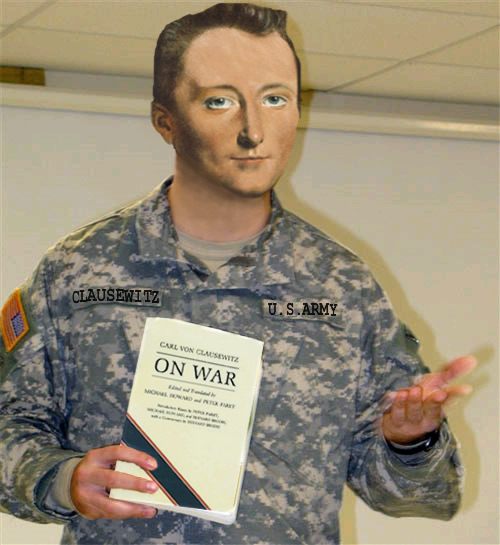 |
| It's a shame that this book isn't required reading at more colleges. |
RealClearDefense
"Clausewitz...views war as a subject that can be studied, understood and that, like engineering (say) or architecture, or any other discipline, improved on. It is possible to get good at killing, and if you’re better at it than your enemy — if you break your enemy’s will to resist (as he would say) — you’ll win. On War provides a slew of these undiluted but axiomatic understandings. Though Clausewitz was a civilized man who recognized war’s horrors, he issued these axioms with a stern warning: “Kind-hearted people might think there was some ingenious way to disarm or defeat an enemy without too much bloodshed,” he writes, “and might imagine this is the true goal of the art of war. Pleasant as it sounds, it is a fallacy that must be exposed: war is such a most dangerous business that the mistakes which come from kindness are the very worst . . . This is how the matter must be seen. It would be futile — even wrong — to try and shut one’s eyes to what war really is from sheer distress at its brutality.”
It is this unblinking ability to call war what it is that has given Clausewitz such a dedicated following that large numbers of military officers have worked to grasp his thinking, and vocabulary. “Clausewitz says that the purpose of war is to achieve a particular political end,” Stoker says. “He argues that the best route to doing this is to attack the enemy’s center of gravity, the center of his strength. That might seem obvious now, but many of the most important parts of our current military thinking were first identified by him.”
Of course much of what Clausewitz tapped into in On War was a reflection of what professional soldiers already knew, and know. Thus, Union General William Tecumseh Sherman issued his famously Clausewitzian statement on war without, apparently, ever having read him. “War is cruelty. There is no use trying to reform it,” he said. “The crueler it is, the sooner it will be over.” Sherman’s unflinching calculus (that true humanity consists in waging war unrelentingly, so as to end it sooner) is, in many ways, a perfect distillation of the U.S. military’s traditional mistrust of the narrative propounded by counterinsurgency advocates that the “center of gravity in a counterinsurgency is the protection of the population that hosts it.” That might have been true in western Iraq, but few would argue that it’s the case with ISIS — particularly after the attacks in Paris. “The Germans and Japanese were held in a vice grip by their leaders in World War Two,” Christopher Bassford says, “but that didn’t stop us from burning down their cities. If it’s safer to be with ISIS than against it, ISIS will retain its hold on the population it now controls.”
In fact, Bassford’s views reflect a growing consensus inside the U.S. military’s upper echelons that a cruel war against ISIS now, no matter how distasteful, will save the lives of many decent people — including many Americans — later.
...Clausewitz, Johnson notes, understood this problem. “To win you have to seize the initiative and keep it,” he says, “and right now we’re not doing that. Right now the tail is wagging the dog. ISIS kills and we respond. But you know, the dog’s supposed to be in charge, not the tail.”
Bassford too is skeptical of airpower alone. “These ISIS guys ultimately will have to be dug out of their holes and slaughtered to a man by fighters on the ground,” he says, then adds that it would be far better if those fighters were Muslim: “We need to help them wipe out the stain on Islam that ISIS represents, but it really has to be their fight.”
While neither Stoker, Bassford or Johnson cited the passage from On War that best reflects this view, it is well known to both military strategists and Clausewitz scholars, and is one of his earliest and most crucial maxims: “If one side uses force without compunction, undeterred by the bloodshed it involves, while the other side refrains,” Clausewitz wrote, “the first will gain the upper hand.” For a growing number of senior U.S. military officers, and particularly for those devotees of the Prussian’s masterpiece, the escalation marked by the Paris attacks requires a shift in U.S. strategy to seize the initiative: to hit them, and relentlessly, before they hit us. Inevitably, and ultimately, such a decision will test not only ISIS’s will to resist — it will test ours."
No comments:
Post a Comment
Note: Only a member of this blog may post a comment.